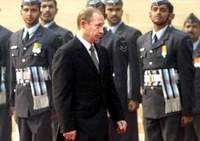Putin to promote nuclear cooperation and military hardware in India
Russian President Vladimir Putin is set to arrive in India, hoping to use the two nations' decades-long friendship to push for deals in civilian nuclear cooperation, military hardware and trade expansion between the booming economies.

Putin, who will be the guest of honor at India's Jan. 26 Republic Day celebrations during his two-day visit starting Thursday, is looking to cash in on Cold War ties that bound the two countries for years - but then slackened as India's burgeoning market attracted other players.
India was a key customer for Soviet weapons, purchasing billions of dollars' (euros') worth of military hardware.
Russia hopes that relationship will continue, especially since India has become the world's foremost buyer of military equipment.
A key element of their relationship was rooted in an unwritten code: that India would buy enormous amounts of Russian military hardware, and Moscow would not supply defense equipment to India's neighboring archrival, Pakistan.
Russian politicians warned there will likely be consequences if India shops elsewhere.
"I believe this situation could stay, but only on condition that India, in its turn, will continue to view Russia as the main source of weapons," Konstantin Kosachev, head of the Russian parliament's foreign affairs committee, told The Associated Press.
He said Pakistan "has shown a huge interest in the development of military-technical cooperation with Russia."
"If we see other trends here, see that India is refocusing to other suppliers, European or American ... Russia in turn will see new opportunities open for cooperation with other nations in the region," Kosachev said, in a clear reference to Pakistan.
The tacit agreement could be tested by India's planned purchase of 126 fighter jets, a deal worth US$6.5 billion to US$10 billion (EUR 5.4 billion to EUR 8.3 billion), from countries where Russia faces stiff competition, including Sweden and the United States.
Russia's state-owned aircraft company, MiG, "is going to participate in that (India's international bidding process ) in the most active way," Russian Defense Minister Sergei Ivanov was quoted as saying by the Interfax-Military news agency.
"We would like to push the MiG-35," said Russia's ambassador to India, Vyacheslav I. Trubnikov, referring to the latest fighter jet in Russia's stable. "This would be a real milestone in our military relations."
For years during the Cold War, the diplomatic map was clear: India and the Soviet Union were close allies, while the United States tilted toward Pakistan.
But times have changed. Washington and New Delhi now share a warm relationship, underscored by a landmark civilian nuclear cooperation deal the two made last year.
The deal gives India, with its energy-desperate economy, access to nuclear technology and equipment it was long denied because it is not a signatory of the international nuclear Nonproliferation Treaty.
The deal appears to give U.S. companies a strong position in India, but Trubnikov described nuclear cooperation as "the most important issue on the agenda during President Putin's visit."
The two countries' nuclear ties are well-entrenched: Russia is helping India build two 1,000-megawatt nuclear reactors in the southern town of Kudankulam - help that Washington had frowned on.
And last year, when uranium supplies ran precariously low at India's Tarapore nuclear power plant, Russia supplied 60 tons, again brushing aside U.S. objections.
"We hope a clear road map for cooperation in peaceful civilian nuclear energy will emerge from the president's visit," Trubnikov told The Associated Press.
Despite longtime Russia-India ties, nonmilitary trade has stagnated. During Putin's last visit to India in December 2004, both sides set an ambitious two-way trade target of US$10 billion (EUR 8.3 billion) by 2010. However, the figures have not edged up from the US$2.76 billion (EUR 2.3 billion) level of two decades ago.
"The volume of Russian-Indian trade looks miserable compared, for example, to India's trade with China," said longtime India-watcher Tatiana Shaumian at the Moscow-based Institute for Oriental Studies.
Moscow wants Indian industry to invest more in Russia's economy, now growing at more than 6 percent a year, Trubnikov said.
Indians have long complained of difficulties in getting Russian visas, and Trubnikov assured a meeting of Indian business leaders last week that the application process is being eased, the AP reports.
"India and Russia share a great sense of comfort," India's ambassador to Moscow, Kanwal Sibal, said Monday in New Delhi. "Whether it's defense or trade, nuclear or energy supplies, they share a strategic partnership. Like old friends whose ties will endure."
Subscribe to Pravda.Ru Telegram channel, Facebook, RSS!




